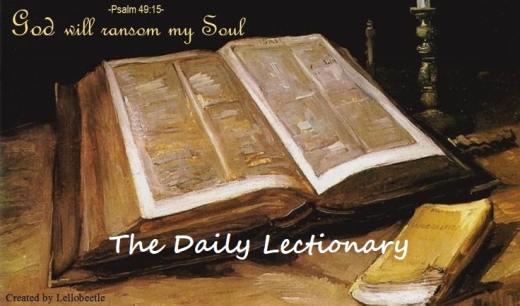 |
| Psalm 27:7-14; Judges 6:11-24; Ephesians 5:6-14 |
The Daily Lectionary
MONDAY, January 27, 2020
(Revised Common Lectionary Year A)
Take courage in God
7 Hear my voice when I call, Lord;
be merciful to me and answer me.
8 My heart says of you, “Seek his face!”
Your face, Lord, I will seek.
9 Do not hide your face from me,
do not turn your servant away in anger;
you have been my helper.
Do not reject me or forsake me,
God my Savior.
10 Though my father and mother forsake me,
the Lord will receive me.
11 Teach me your way, Lord;
lead me in a straight path
because of my oppressors.
12 Do not turn me over to the desire of my foes,
for false witnesses rise up against me,
spouting malicious accusations.
13 I remain confident of this:
I will see the goodness of the Lord
in the land of the living.
14 Wait for the Lord;
be strong and take heart
and wait for the Lord.
God calls Gideon to lead the people
6:11 The angel of the Lord came and sat down under the oak in Ophrah that belonged to Joash the Abiezrite, where his son Gideon was threshing wheat in a winepress to keep it from the Midianites. 12 When the angel of the Lord appeared to Gideon, he said, “The Lord is with you, mighty warrior.”
13 “Pardon me, my lord,” Gideon replied, “but if the Lord is with us, why has all this happened to us? Where are all his wonders that our ancestors told us about when they said, ‘Did not the Lord bring us up out of Egypt?’ But now the Lord has abandoned us and given us into the hand of Midian.”
14 The Lord turned to him and said, “Go in the strength you have and save Israel out of Midian’s hand. Am I not sending you?”
15 “Pardon me, my lord,” Gideon replied, “but how can I save Israel? My clan is the weakest in Manasseh, and I am the least in my family.”
16 The Lord answered, “I will be with you, and you will strike down all the Midianites, leaving none alive.”
17 Gideon replied, “If now I have found favor in your eyes, give me a sign that it is really you talking to me. 18 Please do not go away until I come back and bring my offering and set it before you.”
And the Lord said, “I will wait until you return.”
19 Gideon went inside, prepared a young goat, and from an ephah of flour he made bread without yeast. Putting the meat in a basket and its broth in a pot, he brought them out and offered them to him under the oak.
20 The angel of God said to him, “Take the meat and the unleavened bread, place them on this rock, and pour out the broth.” And Gideon did so. 21 Then the angel of the Lord touched the meat and the unleavened bread with the tip of the staff that was in his hand. Fire flared from the rock, consuming the meat and the bread. And the angel of the Lord disappeared. 22 When Gideon realized that it was the angel of the Lord, he exclaimed, “Alas, Sovereign Lord! I have seen the angel of the Lord face to face!”
23 But the Lord said to him, “Peace! Do not be afraid. You are not going to die.”
24 So Gideon built an altar to the Lord there and called it The Lord Is Peace. To this day it stands in Ophrah of the Abiezrites.
Live as children of the light
5:6 Let no one deceive you with empty words, for because of such things God’s wrath comes on those who are disobedient. 7 Therefore do not be partners with them.
8 For you were once darkness, but now you are light in the Lord. Live as children of light 9 (for the fruit of the light consists in all goodness, righteousness and truth) 10 and find out what pleases the Lord. 11 Have nothing to do with the fruitless deeds of darkness, but rather expose them. 12 It is shameful even to mention what the disobedient do in secret. 13 But everything exposed by the light becomes visible—and everything that is illuminated becomes a light. 14 This is why it is said:
“Wake up, sleeper,
rise from the dead,
and Christ will shine on you.”
Optional parts of the readings are set off in [square brackets.]
The Bible texts of the Old Testament, Epistle, and Gospel lessons are from The Holy Bible, New International Version®, NIV® Copyright ©1973, 1978, 1984, 2011 by Biblica, Inc.® Used by permission. All rights reserved worldwide.
The Daily Lectionary is a three-year cyclical lectionary. We are currently in Year A. Beginning with the first Sunday of Advent in 2020, we will be in Year B. The year which ended at Advent 2019 was Year C. These readings complement the Sunday and festival readings: Thursday through Saturday readings help prepare the reader for the Sunday ahead; Monday through Wednesday readings help the reader reflect and digest what they heard in worship. Revised Common Lectionary Daily Readings, copyright © 2005 Consultation on Common Texts. www.commontexts.org
The Daily Lectionary for MONDAY, January 27, 2020
Psalm 27:7-14; Judges 6:11-24; Ephesians 5:6-14








